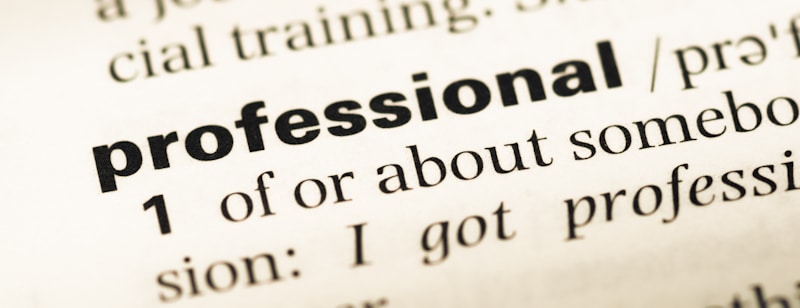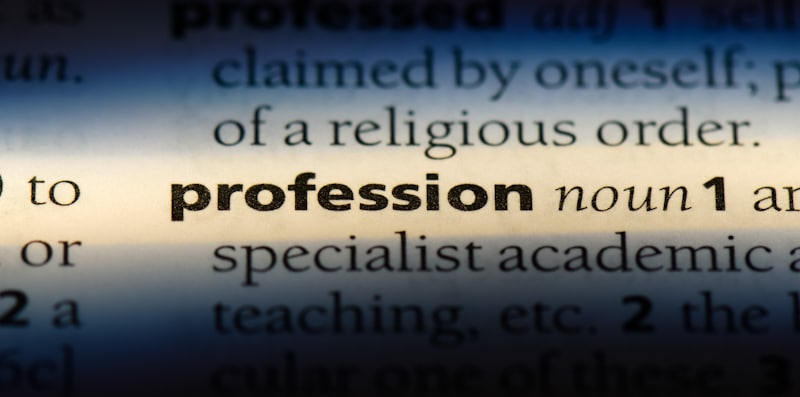Have you ever wondered what the difference is between profession vs. professional? Due to how similar these terms are, sometimes it’s challenging to understand the terminology. This article will explain how to use these words appropriately, comprehend the meaning and learn where it comes from.
A brief explanation of why they are so similar is because they are related to one another. A profession is a job that requires having previous training, formal qualification, or education. The professional is what comes after the profession. You transform into an expert in a position that requires such skills and experience.
So now that we understand how these terms are closely connected, we should now dig in deeper on how they are different and how to use them properly.
Definition of the word
When it comes to understanding the differences between these two terms, it is necessary first to comprehend the meaning.
Profession: (noun) is a paid occupation or job that requires training, qualifications, a high level of education, or a particular skill. This is often one that is respected by many, mainly because of its difficulty and hard work.
In regards to the word “professional,” as stated earlier in the article, is the result of a profession.
Depending on the usage of the word, it has two different meanings.

Professional: (as a noun) is an individual with a job that requires skills, previous training, or education. Due to their hard work, they become masters in their position or occupation. This person needs to show trained ability in a particular field of knowledge.
Professional: (as an adjective) is, in simple words, belonging or relating to a profession, but also engaging in an activity that is its main occupation rather than a hobby.
Usage and Similarities
Even though these terms are almost identical, the usage given to them may differ depending on what you want to refer to and what you want to express.
For example, when it comes to “professional,” it is often used to describe a person who makes a living out of a specialized occupation or job. It represents a standard of education that prepares those individuals with the skills and knowledge required to perform the role. Aside from assigning quality to a person, it also talks about its integrity and morals. In some cultures, this word illustrates educated, well-mannered, and qualified workers for the position. It is expected to possess ethical and moral obligations.
Regarding the term “profession,” it is used to express a vocation founded through educational training and specialization to serve others, which can come with compensation. Also, it provides services in the interest of the public. As time has passed, there’s an incredible increase in technology and higher education which has caused the growth of intensive academic preparation. This is why society started claiming professional status. The rise in status and prestige have created a level of seriousness and importance for the individuals who decide to get into a field of study.
Evidently, the “profession” and “professional” coexist with one another. Without a profession, one can’t be a professional and vice versa. It shows how alike and related these terms are. The same ethics and morals rule them. Furthermore, they are usually governed by these standards that indicate a level of trust and expertise.
Examples with sentences
Here are some sentences with the word “profession”:
- He left the teaching profession to enroll in college and study medicine.
- The majority of students in the profession of Nutrition in the United States are women.
- She’s a teacher by profession because she loves teaching and playing with kids.
- Arts is a very underpaid profession since many people don’t take it seriously.
- He became successful in his profession at the age of 30.
- They are lawyers by profession, and they also own a high prestige law firm.
- Thanks to her ambition and determination, she reached the peak of her profession.
- Being in the medical field, you need a vocation and a profession.
- He prepared himself for the computer science profession.
- Her mother left her previous profession because she wanted to change careers and pursue another field of study.
Now, some sentences with the word “professional”:
Adjective:
- Do you have any professional background?
- Maybe you should ask for professional advice so you can resolve this situation in the best way possible.
- Her presentation was very professional.
- The venue and decor chosen for the wedding looks professional.
- I congratulate you on doing a professional job taking into consideration the difficult circumstances.
Noun:
- Michael Jordan is a professional basketball player.
- He recently became a professional athlete.
- Both amateurs and professionals can enroll in the competition.
- She handled the circumstances like a professional.
- The pool was installed by a professional and did a fantastic job.
Synonyms
Professional: competent, experienced, skillful, licensed, qualified, expert, acknowledged, pro, specialist, ace, adept, crackerjack, slick, able, polished, non-amateur, technicalized, experienced, master, proficient, educated, prepared, schooled, trained, directorial, magisterial, skilled, veteran, etc.
Profession: employment, occupation, work, career, calling, vocation, line of work, position, job, art, role, pursuit, field, craft, avocation, service, chosen work, mission, livelihood, assignment, gig, handcraft, duty, function, workload, task, specialty, education, forte, etc.
Antonyms
Professional: inexpert, nonprofessional, unprofessional, general, non-technical, common, generic, nonexclusive, ordinary, amateur, inefficient, untalented, untrained, clumsy, rookie, unskilled, unable, incompetent, incapable, ignorant, inexperienced, apprentice, beginner, novice, non-expert, etc.
Profession: recreation, hobby, unemployment, entertainment, pastime, surrender, joblessness, etc.
Origin of the term
Profession
The term “profession” comes from Middle English around the twelfth century. It means “denoting the vow made upon entering a religious order.” It also comes from the Old French word “professioun,” Latin “professio,” which means to declare publicly. It derives from the participle stem “profiteri,” which means “to profess” of an occupation that “one professes” to be skilled.
Professional
It appeared in the mid-fifteenth century from the term “profeshinalle,” which refers to the profession of religious orders. Then, by 1747-1798 it transformed the meaning into “appropriate to a profession or calling,” often used to describe traders. As people became experts in trading back then, they “profess” their abilities to others and perform their trade to the highest standard. Later on, these trustworthy workers started being called “professionals,” and this term gained popularity around the 1900s to 2010. It began around the twentieth century in American English, but in British English, it acquired popularity around the 1930s-1960s.
Conclusion
Finally, we can conclude that regardless of “professional” and “profession” being closely related to one another, it also has its differences. “Profession” is the occupation someone gets due to previous training or extensive education, while on the other hand, “professional” is what one becomes after reaching a higher level of education or acquiring skills.
That being said, we can use this term to describe people that possess these qualities and meet a certain standard, moral and ethical codes. Also, it shows how trustworthy and skillful an individual might be. Because these words are associated with the topic of being competent and an expert at something, it is understandable why some people would be confused when using the word due to its alikeness. Now that we fully comprehend how to use them appropriately, it is pretty visible that there’s no professional without a profession.
Shawn Manaher is the founder and CEO of The Content Authority. He’s one part content manager, one part writing ninja organizer, and two parts leader of top content creators. You don’t even want to know what he calls pancakes.


